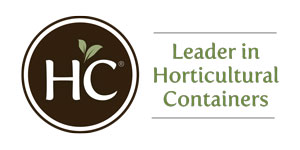10/1/2021
The Future Is Sustainable
Craig Ruvere


Sponsored Editorial
With the subject of climate change now a frequent conversation in communities and businesses globally, consumers are becoming more vocal with their environmental support by the votes they cast, sensible opinions they express and with their wallets.
The newest EY Future Consumer Index, monitoring changing consumer behaviors across global markets, reports 68% of global consumers believe companies are responsible for driving positive environmental outcomes through sustainable-focused innovation. In the United States, 64% of consumers are willing and even expect to pay more for sustainable products.
Pictured: These fiber pots from The HC Companies are an example of sustainable options available for growers and garden retailers. Visit www.hc-companies.com.
Several scholars believe implementing sustainable practices is an invaluable differentiator. Professor Knut Haanaes of the International Institute for Management Development in Switzerland says, “Simply put, sustainability is a business approach to creating long-term value by taking into consideration how a given organization operates in the ecological, social and economic environment. Sustainability is built on the assumption that developing such strategies fosters company longevity.”
With the U.S. Chamber of Commerce reporting that U.S. spending on sustainable products will skyrocket to $150 billion (or 25% of all goods sold in 2021)—a near 50% increase from 2014—garden centers and retailers can no longer shy away from the demands of a more sophisticated and environmentally responsible consumer.
The Importance of Certifications
Consumers are becoming more aware of greenwashing techniques, or companies spending time and money trying to convince the public of their “eco-friendly” status rather than developing the products and processes necessary to defend their ESG (environmental, social and corporate governance).
That’s why it’s critical when your organization is sourcing a “sustainably” branded product to add to your inventory that the vendor has provided a credible, up-to-date, third-party certification. Properly vetting products provides consumers with a level of trust in not only your inventory, but also your dedication to an overall environmental commitment.
A Product’s Composition
More health-minded consumers often read labels at the grocery store to understand what ingredients their foods are composed of for optimal benefits. The same methodology applies to more environmentally responsible consumers when making a purchasing decision; therefore, garden centers and retailers must optimize the value proposition for the sustainable products in their inventory.
Product labeling is an excellent way for consumers to quickly find the information they’re looking for before heading to the checkout counter. But is the information clear and transparent, i.e., void of marketing jargon that provides little to no value? Are you leveraging signage and collateral touting the product’s benefits and how it contributes to one’s environmental footprint?
Supporting a New Generation of Growers
Aflac recently conducted a report in which 77% of consumers agreed they’re more willing to purchase from an organization with a firm CSR (Corporate Social Responsibility) pledge. Businesses concurred, with nine in 10 leaders saying consumers would hold them accountable for their overall environmental impact.
A new generation of growers who understand and value a more sustainable lifestyle is entering the industry and will expect the garden centers and retailers they choose to do business with will offer the products they crave. Additionally, the younger generation wants to work for a company with a well-thought-out CSR, helping increase a retailer’s workforce pool with candidates passionate about their work, the business and the environmental impact we all share. GP
Craig Ruvere is Marketing Communications Manager for The HC Companies. He can be reached at CRuvere@hc-companies.com.